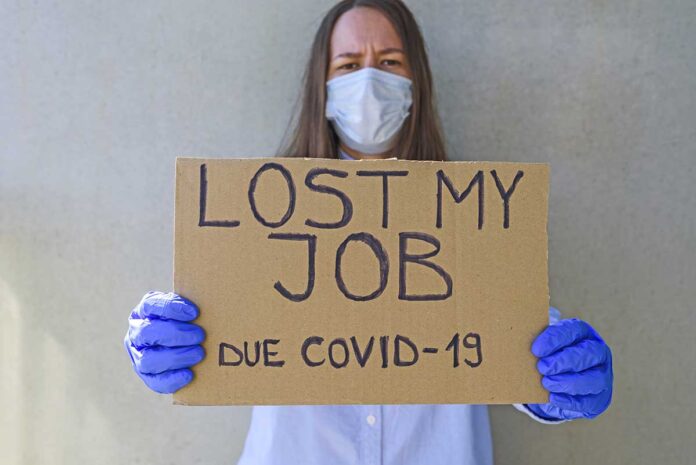In the December monthly jobs report from the U. S. Bureau of Labor Statistics (BLS), it was revealed that the US lost 140,000 jobs in December. Also revealed was that all of those jobs were held by women. All of them.
Queer and trans women have already been disproportionately impacted by the economic crisis accompanying the coronavirus pandemic. It just got worse.
The unemployment rate — now at 6.7% — has steadily decreased over the past few months as jobs have slowly returned. But jobs for women and LGBTQ people have not risen proportionate to their demographics.
As a new report released from the Movement Advancement Project (MAP) indicated, LGBTQ households — especially those headed by Black and Latinx LGBTQ people — experienced disproportionate, negative impacts as a result of the COVID-19 pandemic.
The December jobs report underscores how bad it is for women overall and LGBTQ women in particular. The National Women’s Law Center (NWLC), a nonprofit focused on achieving gender justice in courts and public policy, examined the U.S. government data to find that women lost 111% of the jobs in December — a staggering statistic.
“The most recent Bureau of Labor Statistics (BLS) monthly jobs report shows that the economy lost 140,000 net jobs in December, marking the first month of job loss since the economy started adding back jobs in May 2020,” said a statement from the NWLC. “All of the jobs lost were women’s jobs, with women losing 156,000 jobs and men gaining 16,000.”
Black, Latinx, queer and trans women disproportionately work in jobs that lack paid sick leave or the ability to work from home. The NWLC found Black women most impacted, with 1 in 12 unemployed people being a Black woman. Next were Latinx women at 1 in 11. Those figures represent 8.4% and 9.1.% unemployment rates, as compared with 5.8% of white men who reported unemployment in December.
NWLC examined the trends since the pandemic began and found that about 38.6% of women over the age of 16 who lost jobs during the pandemic had been unemployed for at least six months as of the December report. Among Black women the number was 40.8%, among Latinx women, 38.3% and among Asian women, 44%.
There was no specific number for LBT women, but the MAP report, titled The Disproportionate Impacts of COVID-19 on LGBTQ Households in the U.S., was succinct: as a direct result of the pandemic, LGBTQ households experienced higher rates of job losses, as compared to non-LGBTQ households, dovetailing with the NWLC report.
The MAP report cites nearly two-thirds (64%) of LGBTQ people and their families experienced a job loss or disruption, compared to just under half (45%) of non-LGBTQ households. These numbers parallel the NWLC numbers on women.
The jobs losses for LGBTQ women — particularly women of color — are easy to assess from the NWLC report. Woman-dominated fields like education, retail, restaurant, bar and other hospitality sectors have been decimated during the pandemic, as have small businesses. In December, restaurants and bars cut the most jobs by far, and part-time workers were hit especially hard.
Women comprise 52% of the hospitality and leisure industry workforce. In local and state government jobs, women account for 58% of the jobs. And in retail, women account for 61% of the workforce.
PGN has reported throughout the pandemic on the impact of job losses on the queer and trans communities. Interviews conducted among Philadelphian, South Jersey and suburban LGBTQ women have found that lesbians have lost jobs in education, child care services and the restaurant and bar industry, while trans women, already disproportionately unemployed due to discriminatory hiring practices, have lost jobs in retail, salons and entertainment venues. Jobs in the clothing and accessories industries were especially hard hit.
The NWLC analysis found a net loss of 5.4 million jobs for women since February, immediately before the pandemic hit. That represents more than half of all jobs lost since the pandemic began. In April alone, women accounted for 55% of the 20.5 million jobs lost.
According to Fortune, the jobs losses incurred by women coincide with the surge in COVID-19 cases nationally. The explosion of cases has caused more cuts in the hospitality and leisure sectors, where many out LGBTQ women work. There, a reported 56.6% of jobs lost were held by women.
“We are creating inequality 20 years down the line that is even greater than we have today,” Betsey Stevenson, a professor of economics and public policy at the University of Michigan, told the New York Times. “This is how inequality begets inequality.”
The pandemic is squeezing women out of the workforce and for LBT women, already impacted by job discrimination due to sexual and gender identity, the prospects for new employment are grim.
The MAP report concluded that “Since LGBTQ people have a higher rate of employment discrimination overall, they may struggle to find new jobs as a result of these job losses.” Concomitantly, NWLC determined that for women, finding new employment when the areas in which women work continue to be limited would extend the disproportionate unemployment issues for women, widening an already large gender gap in employment that may extend for years past overall recovery from the pandemic.
